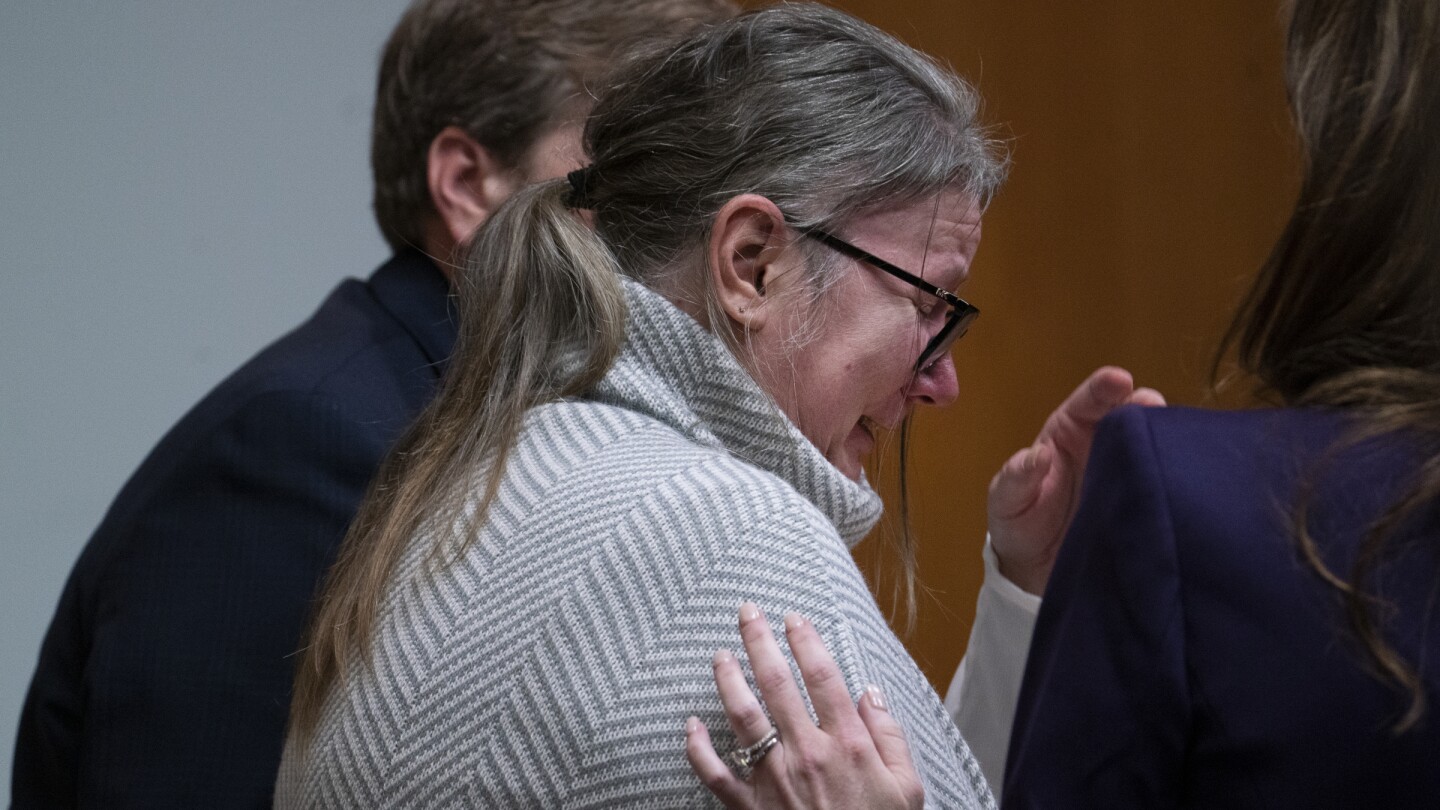PONTIAC, Mich. (AP) — A school shooting that killed four students in Michigan could have been prevented if the mother of the armed teen had removed him after seeing his violent drawings that same day, a prosecutor told jurors Thursday in an uncommon trial about parental responsibility.
Jennifer Crumbley is charged with involuntary manslaughter in the Nov. 30, 2021, attack at Oxford High School. Prosecutors say she and husband James Crumbley were grossly negligent and that their son’s actions were foreseeable.
Jennifer Crumbley was aware of Ethan Crumbley’s deteriorating mental health and social isolation and knew that a gun drawn on a math assignment resembled the one that he had used with her at a shooting range, assistant prosecutor Marc Keast said.
“This was a purchase celebrated by Jennifer on Instagram: ‘Mom and son day testing out his new X-mas present,’” Keast said, quoting a social media post.
Instead of taking the boy home from school after seeing the drawing, Jennifer and husband James Crumbley left a meeting after 11 minutes and allowed him to stay. He soon killed four students and wounded several others. No one had checked his backpack for a gun.
The case against Jennifer Crumbley and her husband, who will stand trial in March, marks the first time that a parent has been charged in a mass shooting at a U.S. school.
“Even though she didn’t pull the trigger, she’s responsible for those deaths,” Keast said in his opening statement.
Keast focused on two key themes: access to a gun at the Crumbley home and the school meeting on the day of the shooting, when a teacher was alarmed by the teen’s drawing of blood and a gun and the phrase, “The thoughts won’t stop. Help me.”
“The two people in the world that had all of the information, all the background to put this drawing into context, were James and Jennifer Crumbley,” Keast said. “They didn’t say anything.”
They failed to follow through on “small and easy things that would have prevented all this from happening,” he said.
Defense attorney Shannon Smith told jurors that evidence of the shooting will “make you sick and disgusted.” But she said Jennifer Crumbley was manipulated by her son and wasn’t to blame.
Jennifer Crumbley, who will testify in her own defense, was a “hypervigilant mother who cared more about her son than anything in the world,” Smith said.
“Band-Aids don’t stop bullet holes,” she said, quoting a Taylor Swift song. “That’s what this case is all about — the prosecutor attempting to put a Band-Aid on problems that can’t be fixed with a Band-Aid.”
The first day of testimony ended with federal firearms agent Brett Brandon, who helped introduce video of the shooter and Jennifer Crumbley at a shooting range three days before the assault. The teen appeared confident as he examined his paper targets and helped his mother handle the 9 mm gun.
On cross-examination, Brandon acknowledged there was nothing illegal about taking the teen to a shooting range. He also said he didn’t know how the gun was stored at the Crumbley home.
Earlier, there was tension in court after jurors saw a brief video captured by a school security camera on the day of the shooting. Prosecutor Karen McDonald claimed Jennifer Crumbley and Smith were “sobbing” in violation of the judge’s request that people control their emotions during the trial.
“We were not sobbing or making a scene,” Smith said, her voice rising. “All my eye makeup is still on.”
The video was shown during the testimony of an assistant principal, one of only two staff eyewitnesses expected to be called by prosecutors to describe that day’s chaos.
A gun store employee, Cammy Back, told jurors that James Crumbley, accompanied by his son, bought a Sig Sauer handgun four days before the Oxford shooting. Jennifer Crumbley was not at the store.
Ethan Crumbley, 17, was sentenced to life in prison in December after he pleaded guilty to murder, terrorism and other crimes. He was 15 at the time of the shooting.
The parents have been in jail for more than two years awaiting trial, unable to afford a $500,000 bond. Involuntary manslaughter in Michigan carries a maximum sentence of 15 years in prison.
___
Follow Ed White at https://twitter.com/edwritez

